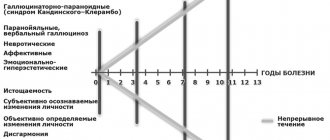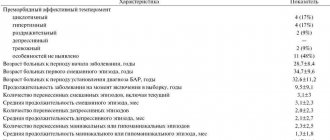Doctors at the Leto Mental Health Center observe various types of disorders. Among them is explosive psychopathy - a personality disorder that is manifested by ardor, short temper, conflict behavior and even aggressiveness. Such people literally suffer from themselves - they are aware of the inconvenience that arises because of them for those around them. If you find the same symptoms in your loved ones, call 8(969)060-93-93 , we will help you get rid of the pathology, and your loved ones will regain the joy of life.
Total information
The word “explosive” is borrowed from the English language - in translation “explosion” (pronounced “explosion”) means “explosion”. The character of the sufferer can really be called “explosive” - unpleasant symptoms arise suddenly. This is one of the most common types of psychopathy - a disorder, the essence of which psychologists convey in three words:
- disinhibition;
- courage;
- meanness.
It happens that you were suddenly attacked by a saleswoman at the market, or an opponent “drove” over you on social networks, although it seemed that you did nothing to provoke such a pronounced reaction. It is possible that these individuals suffer from the described disease. Thanks to many years of experience, our specialists are able to discern this pathology.
The aggression of people who have been diagnosed with this form of psycho-emotional disorders is forced to be tolerated by their environment. If they accidentally ended up in someone’s personal space, that’s not so bad; further communication can be avoided so as not to repeat the sad experience. But such individuals suffer from family members and other relatives, friends, work colleagues, neighbors - it is impossible or difficult for these categories to simply stop communicating due to life circumstances.
Hysterical type of psychopathy (hysterical psychopathy)
Hysterical psychopathy clearly manifests itself at puberty. The hysterical type is often characterized by the desire to achieve recognition by any means, to be visible and in the center of attention. The hysterical type is more common in girls. Some hysterical traits can appear even in preschool age. Girls strive to stand out with their clothes, command other children, perform at matinees and school events, and listen to praise. At school age, the desire to be first intensifies, pronounced selfishness appears, ignoring the interests of other children, and jealousy of the successes of classmates. Emotional reactions can be very vivid, and behavior can be demonstratively theatrical. To gain recognition, children can use intrigue, slander, fantasies, fiction and some of their unusual adventures or secrets. In adolescence, demonstrative suicide attempts and participation in extravagant groups (emo, rockers, bikers, metalheads, etc.) may be observed. In the origin of hysterical psychopathy, upbringing according to the type of family idol, hereditary and constitutional factors play a role.
Causes
The immediate cause of explosive psychopathy is the characteristics of the central nervous system:
- congenital;
- acquired.
In the latter case, such “acquisition” is usually observed at an early age. Several forms of pathology have been identified:
- nuclear - appears against the background of human physiological characteristics;
- marginal - develops due to unfavorable external influences.
The causes of the nuclear form are:
- unfavorable heredity - usually this form of behavior is observed in other family members;
- disruption of pregnancy in the individual's mother;
- complex (often pathological) childbirth, during which it appeared;
- developmental disorders at an early age.
The causes of the marginal form of explosive psychopathy are:
- lack of proper education;
- regular conflicts between father and mother in front of the child;
- childhood psychotrauma;
- chronic long-term illnesses;
- traumatic brain injuries and their consequences.
To help such patients, we carefully study each case individually and take into account all the nuances. Our doctors believe that important causes of regional explosive psychopathy are also violation of the personal space of a child or adolescent, persecution by others, regular humiliation in the family and society, extremely gross suppression of the individual, and indifferent attitude towards minors. Although the disorder often arose in the opposite situation - in the case when the child was adored, indulged in every possible way, and did not prohibit any actions.
Typically, explosive psychopathy is identified with such features as:
- extroverted character type;
- explosive temperament;
- lack of self-control;
- stubbornness.
The sooner the atmosphere in which a child lives is normalized, the greater the chance that he will not suffer from explosive psychopathy. If, as he grows up, he is surrounded by restrained, wise, calm people, this is a favorable factor; thanks to it, an explosive child will grow into a person who will take care of the moral comfort of those around him.
The marginal form is easier and faster to correct, and we have extensive experience in its implementation. Disorders of behavioral reactions are less pronounced, the patient is more socially labile - ready to control his behavior and work on himself. The nuclear form has a less favorable prognosis.
Pathogenesis and etiology of the disorder
A clear cause for the disorder has not been identified, but according to some theories, it may be caused by the following factors:
- The surrounding society . Most epileptoids grew up in an environment where aggressive behavior combined with violence is considered the norm. As children grow older, they acquire the same traits as adults.
- Heredity . The etiology of epileptoid psychopathy may involve a factor of genetic predisposition, as a result of which the disease is transmitted to children from the mother or father.
- Brain Chemistry . Serotonin (the pleasure hormone that prevents depression) functions in such patients, perhaps differently than in healthy people.
- Birth injuries and head injuries cause the development of epileptoid psychosis as a compensatory reaction.
- Infectious diseases of the central nervous system.
The epileptoid type of character accentuation can also develop due to the following reasons:
- Sexual or physical abuse . People who have experienced such humiliation have an increased chance of developing this psychopathy.
- Other types of mental disorders . People with any other antisocial disorder, including disruptive behavior, are also at risk.
Signs
The basic symptom of the described disorder is outbursts of anger. They:
- repetitive;
- uncontrolled;
- provoked by the slightest psycho-emotional stimuli.
Based on careful observation of patients, doctors at the Leto clinic believe that the effect of such irritants is just a formal reason for the appearance of rage; in fact, it can arise “out of nothing.” Typically, attacks of explosive psychopathy are preceded by banal everyday and work troubles:
- breakfast untimely prepared by the wife;
- a child's poor grade at school;
- subordinate being late for work;
- crowding on public transport and so on.
Ordinary ordinary situations cause aggression, projected onto others. The person himself points out what turned him on. But often there is no visible reason - the eruption of such an emotional “volcano” is possible against the background of complete well-being, in the absence of any provocative factors.
His relationships depend on how much the patient can control outbursts of anger:
- family;
- friendly;
- workers;
- social.
Many people find a personal way to calm themselves as soon as the first signs of an attack appear, and thanks to this they save their families, jobs, and so on. Others are unable to do this - not due to a lack of desire, but due to physiological deviations in the activity of the brain, due to which they are not able to adapt in society. Therefore they:
- often get married and divorced;
- change jobs regularly;
- can't make friends.
Such individuals with explosive psychopathy are often diagnosed with somatic diseases that arise from stress. This:
- peptic ulcer of the stomach and duodenum - the formation of one or more deep defects in the walls of these organs;
- myocardial infarction - necrosis of a fragment of the heart muscle, which develops against the background of a violation of its blood supply;
- Diabetes mellitus is a failure of carbohydrate metabolism due to a lack of the hormone insulin.
Therefore, if necessary, we involve related specialists if our patients need their consultation. We have huge long-term collegial connections with other clinics, and we treat not the disease, but the patient - this is precisely the postulate that is one of the most important in medicine.
Unstable type of psychopathy (unstable psychopathy)
The unstable type of psychopathy most often manifests itself in prepubertal age. Such children exhibit weakness of will, volitional delays, increased suggestibility, instability of interests, superficial judgments, frivolity, increased desire for pleasure, and a thirst for new experiences. Children do poorly at school, quickly fall under the influence of specific asocial companies, leave home and school, wander, smoke, drink alcohol, and use drugs. In companies they always play a subordinate role. Unstable psychopathy is often based on psychophysiological infantilism.
Features of the flow
Symptoms of explosive psychopathy are observed already in childhood. The child is usually disobedient, unyielding, stubborn, and often conflicts with peers. Often he even uses physical force to defend his interests.
Patients in adulthood may be aware that they have abnormalities, but are unable to control them. They do not know how to regulate conflicts of varying degrees of severity, even if this is fraught with stress for themselves.
Explosive psychopathy is not a character trait, but a deviation. It must be combated, as it can cause serious administrative and criminal violations. Such people are capable of “getting excited” for literally a trifle.
Symptoms at different stages of growing up
The disease manifests itself in different ways - it all depends on age.
If you know these nuances, you can prevent further progression of psychopathy. And the sooner you start treatment, the better. As you get older, epileptic psychosis manifests itself as follows:
- The child is an epileptoid. A child with this disorder may cry for a very long time, even for several hours, and it is impossible to calm him down. Such children want to be a tyrant in games, dictating the rules. They love to surreptitiously torment the younger ones and those who cannot give them back, and abuse their pets. These are “difficult children”, fighters who do not get along well in a children's group. In elementary school, children with such psychopathy are distinguished by “hypersocial” traits: excessive accuracy when filling out copybooks and notebooks and careful handling of their belongings.
- The teenager is an epileptoid. The most highly excitable psychopathy manifests itself at the time of puberty. At this age, sick teenagers are characterized by dysphoria - anger, apathy, and a sullen appearance. Teenagers themselves look for reasons to incite conflict. Even a slight restriction of freedom can lead to an attack of aggression. Such teenagers are characterized by harsh language and cruelty, and sometimes a tendency to self-harm. Such teenagers often become pyromaniacs and dromomaniacs.
- Adult psychotic. By the time they are growing up, psychopaths begin to exhibit antisocial and illegal behavior, and practice alcohol abuse or debauchery. Some patients by the age of 30 can eventually learn to control their outbursts of anger - then they interact with society without problems. The majority ends up in colonies and prisons, where they play the role of informal negative leaders.
Cost of services
| CONSULTATIONS OF SPECIALISTS | |
| Initial consultation with a psychiatrist (60 min.) | 6,000 rub. |
| Repeated consultation | 5,000 rub. |
| Consultation with a psychiatrist-narcologist (60 min.) | 5,000 rub. |
| Consultation with a psychologist | 3,500 rub. |
| Consultation with Gromova E.V. (50 minutes) | 12,000 rub. |
| PSYCHOTHERAPY | |
| Psychotherapy (session) | 7,000 rub. |
| Psychotherapy (5 sessions) | 30,000 rub. |
| Psychotherapy (10 sessions) | 60,000 rub. |
| Group psychotherapy (3-7 people) | 3,500 rub. |
| Psychotherapy session with E.V. Gromova (50 minutes) | 12,000 rub. |
This list does not contain all prices for services provided by our clinic. The full price list can be found on the “Prices” , or by calling: 8(969)060-93-93. Initial consultation is FREE!
Treatment
It is carried out with the assistance of psychotherapy. The task is quite complex because you have to influence:
- human value system;
- his life principles;
- ability to relate to others.
A patient with explosive type psychopathy must himself show a desire so that others do not suffer from his actions - otherwise it will be difficult to influence him. Usually they undergo group psychotherapy sessions, thanks to which they learn to behave with the environment in various situations. This skill is reinforced in individual lessons.
Drug treatment is also carried out. Are used:
- neuroleptics - to relieve agitation;
- sedatives;
- antidepressants - according to indications and other drugs.
Doctors at the Leto mental health center know how to help patients with explosive psychopathy. They use only proven treatment methods and are guided by the experience of colleagues - Russian and foreign. Call the phone number 8(969)060-93-93 - we will listen to you very carefully and help you overcome this unpleasant problem.
Epileptoid type of psychopathy (epileptoid psychopathy)
The onset of epileptoid psychopathy usually occurs in prepubertal age.
However, sometimes even preschoolers already exhibit pedantry, excessive accuracy, thoroughness, and viscosity. Any discomfort or infringement of rights causes violent affective and motor reactions. An angry mood, unlike excitable psychopathies, lasts a long time. Children are usually vindictive. At school age, children develop more pronounced egocentrism, a desire to fight for order, and an unfriendly, hostile attitude towards people around them.










